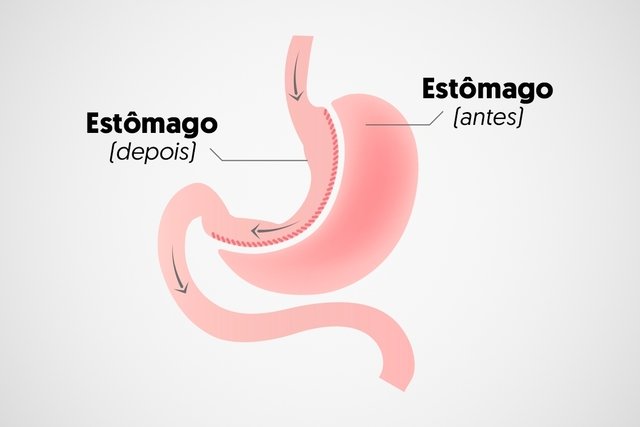O sleeve Gastric surgery is a type of bariatric surgery that is done with the aim of treating obesity. The surgery, also known as sleeve gastrectomy, involves removing the left part of the stomach, which reduces its capacity to store food and can lead to a loss of up to 40% of initial weight.
Bariatric sleeve surgery is indicated in the treatment of obesity when the use of other, more natural methods has not shown any results even after 2 years, or when the person already has a BMI greater than 50 kg/m².
Furthermore, the gastric sleeve It can also be done in people with a BMI of 35 kg/m², who also have heart or respiratory diseases or decompensated diabetes, for example. See when bariatric surgery is indicated.
See more about sleeve gastric surgery with Dr. Rogerio Villela:
How is the surgery done
The surgery of sleeve Gastric surgery is performed under general anesthesia and lasts, on average, 2 hours. However, it is common for the person to be admitted to the hospital for at least 3 days.
Generally, this surgery is performed via laparoscopy, in which small holes are made in the abdomen, through which tubes and instruments are inserted to make small cuts in the stomach, without the need to make a large cut in the skin.
During surgery, the doctor makes a vertical cut, cutting the left part of the stomach and leaving the organ in the shape of a tube or sleeve, similar to a banana. In this surgery, up to 85% of the stomach is removed, making it smaller and causing the person to eat less.
Main advantages
The main advantages of sleeve gastric, in relation to other types of bariatric surgery are:
- Ingest between 50 and 150 ml of food capacity, instead of 1 L, which is the usual standard before surgery;
- Greater weight loss than that obtained with the adjustable gastric band, without requiring band adjustments;
- Transform gastrectomy into bypass gastric, if necessary;
- The intestine does not undergo changes, with normal absorption of important nutrients occurring.
It is still a technically simpler surgery than the bypass gastric, allowing weight loss over several years and with less risk of complications.
However, despite all the advantages, it remains a very aggressive technique for the body and with no possibility of being reversed, unlike other forms of simpler surgery, such as the placement of a gastric band or a balloon.
Which doctor to consult?
The best doctor to consult if you wish to undergo bariatric surgery is an endocrinologist. This specialist will carry out a detailed assessment and advise on the most appropriate forms of treatment, according to your weight, health history and personal goals.
Taking care of your health has never been easier!
Possible risks
O sleeve Gastric acid can cause nausea, vomiting and heartburn. However, the most serious complications of this surgery include the appearance of a fistula, which is an abnormal connection between the stomach and the abdominal cavity, which can increase the chances of infections. In these cases, further surgery may be necessary.
What is recovery like?
Recovery from surgery can take between 6 months and 1 year, with weight loss being gradual and there being a need to make changes to your lifestyle.
Therefore, the person who has had a gastrectomy must follow the guidelines:
- Go on a diet recommended by the nutritionist. See what nutrition should be like after bariatric surgery.
- Take a gastric protector such as omeprazole, prescribed by the doctor, before meals to protect the stomach;
- Take painkillers orally, such as paracetamol or tramadol, as advised by your doctor, if you have pain;
- Practice light physical activities after 1 or 2 months, according to the doctor’s assessment;
- Make the dressing one week after surgery.
All these precautions must be followed so that recovery is less painful and faster. See more tips on what to do after bariatric surgery.
Bibliography
- COLUMBIA UNIVERSITY. Sleeve Gastrectomy. Disponível em: <https://columbiasurgery.org/conditions-and-treatments/sleeve-gastrectomy>. Acesso em 09 ago 2023
- HEALTHDIRECT AUSTRALIA. Gastric sleeve surgery. Available at: <https://www.healthdirect.gov.au/gastric-sleeve-surgery>. Accessed on Aug 9, 2023
- NHS. Weight loss surgery. Disponível em: <https://www.nhs.uk/conditions/weight-loss-surgery/>. Acesso em 09 ago 2023

Sign up for our newsletter and stay up to date with exclusive news
that can transform your routine!
Warning: Undefined array key "title" in /home/storelat/public_html/wp-content/plugins/link-whisper-premium/templates/frontend/related-posts.php on line 12
Warning: Undefined array key "title_tag" in /home/storelat/public_html/wp-content/plugins/link-whisper-premium/templates/frontend/related-posts.php on line 13




